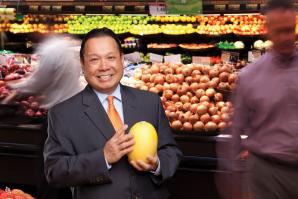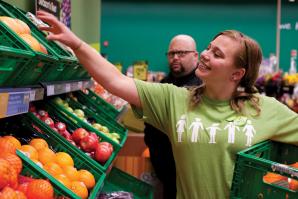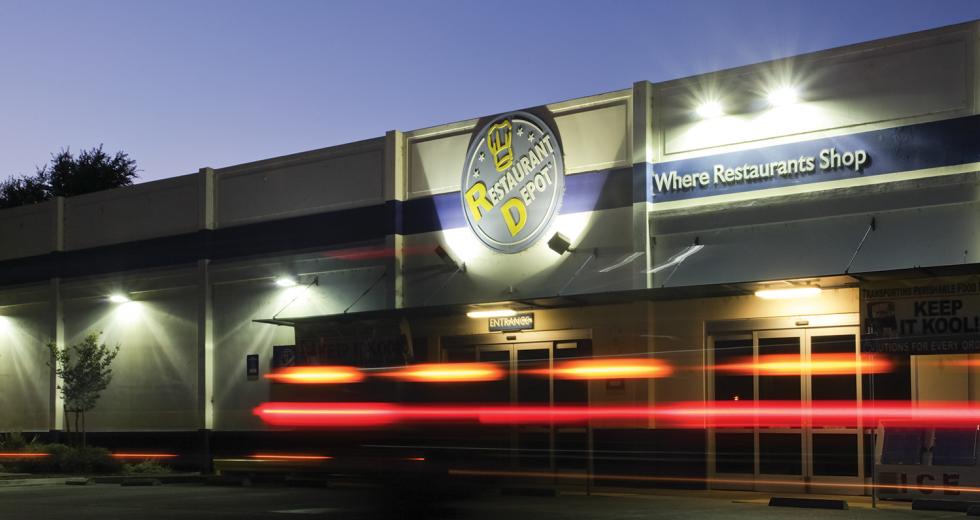The next time you dine at Burgers and Brew, Crepeville or Chops Steak, Seafood & Bar, you’ll likely eat something purchased from Restaurant Depot. Those popular eateries are among the regular customers of the privately owned food-service wholesaler at 1275 Vine St. in the River District.
Stacked from floor to high ceiling, the almost 70,000-square-foot warehouse is packed with nearly everything a restaurant could want. Open seven days a week, it sells fresh and frozen meat and produce, dry groceries, beverages, equipment, cleaning supplies, paper goods and more.
One aisle has about every size and material of disposable cup imaginable, one has frozen whole goats, another is lined with gallon jugs of various hot sauces, while yet another has several kinds of black-fungus mushrooms and spices popular with Chinese restaurants.
“We have things that you wouldn’t even realize go into the foods that you eat,” says Steven Taranto, branch manager. While the major portion of the business is food sales, customers appreciate the one-stop-shop aspect. “A lot of people run their entire business from here. We get trucks of products all day long, five or six days a week.”
Most customers are independent business owners with one to three restaurants. “We get a lot of mom and pops, and some caterers — even taco trucks,” Taranto says. “We get some chains, but not many. We’re not really geared toward them.”
Other regular customers include Rudy’s Hideaway Bar & Grill, Randy Peters Catering, Kathmandu Kitchen, India Oven, Chung King Chinese Buffet and Tuk Tuk Restaurant.
With corporate offices in College Point, N.Y., Restaurant Depot has more than 80 locations throughout the country, staffed by many former restaurant owners and chefs.
The Sacramento warehouse opened in November 2007 and employs nearly 60 workers. The management team consists of Taranto, his two assistants — one for operations and one for merchandising — and department heads. The River District location has been convenient for downtown eateries.
“Most have shopped with us at least once, and some use us all the time,” Taranto says. Then there are some who come in for filler items when they run out of supplies before their regular shipments come in.
While it’s up against large competitors, such as Sysco Corp. and U.S. Foodservice, Restaurant Depot does have an advantage over wholesalers that use off-site ordering. “The big plus for us is you can touch and feel it,” Taranto says. Some of the food products — rice, nuts and tomatoes — come from local farms, but the warehouse needs to have a steady supply of produce and meat year-round, so it’s purchased from all over the world. “We get all our goat and lamb from Australia,” Taranto says. “It comes frozen and takes six weeks to get here. Shrimp is from Thailand, Malaysia or China.”
Products also come directly from the source, rather than from a centralized company warehouse. This system allows for more meat to be delivered fresh rather than frozen.
Taranto says he stays competitive by making customer service a top priority. “Our customers are dependent on us because if we don’t have what they need, then they can’t make their money,” he says. “If you go to the grocery store to buy some potatoes and they’re out of Yukon Golds, you’ll say, ‘OK, I’ll just make red potatoes tonight.’ But maybe the chef here only uses Yukon Golds, so then he’s gotta change the menu.”
The job definitely has its rewards, Taranto says. “One of my favorite things to see as a manager [is our] customers helping other customers because it means they believe in us,” he says.
“We’ve also made some good friends here,” he says. “My wife and I try to go out to dinner every two weeks to a new customer. They know me and take us in and let me into the kitchens. It’s a good feeling because they’ve provided for us, and I see how we’re providing for them and their families — and saving them money.”
Recommended For You

A Grower’s Eye
Acuity with Ronald Fong
Ronald Fong, 52, has served as president and CEO of the California Growers Association since 2008. The CGA is a nonprofit, statewide trade association representing more than 500 retail members operating 6,000 food stores and 200 supply companies in California and Nevada.

Grocery Wars
Superstores loom over established regional grocers
With a new Vacaville store and six locations poised to open in the Sacramento area, Fresh & Easy Neighborhood Market Inc. is revving up competition in the already-crowded Northern California grocery scene.



